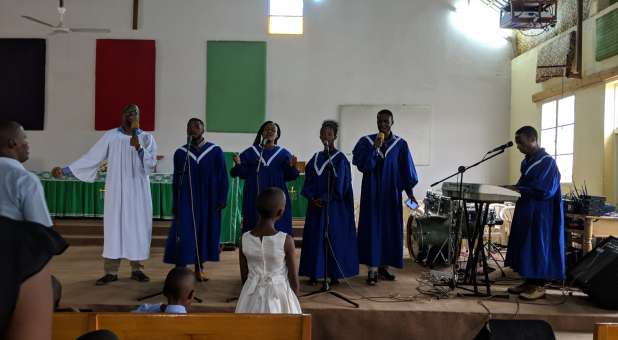‘They Were Baptizing One Another in Blood’
The singers are swaying, hands raised as they worship the Lord and call for fire to fall down “Like on the day of Pentecost.” It’s a far cry from the bloodshed the country was known for not even 25 years ago.
It’s early Sunday morning in the capital city of Rwanda, Kigali. People trickle in as worship continues. One robed singer even hops on stage mid-song to swap with another woman who is about to teach Sunday school.
The familiar presence of the Holy Spirit greets those who gather as they welcome the visitors. Attendees seem content, relaxed, happy to be in service. The worn prayer books are reverently held in hands as people respond to the call.
A man stands up and shares readings from Jeremiah and Acts.
“Thanks be to God,” the congregation responds, reflecting on the miracles, signs and wonders they’ve seen in their own lives.
The guest pastor opens his own Bible to Ephesians to preach on one of the deepest rivalries in Scripture—Jews and Gentiles.
“We are one body in Christ,” he says. “God’s plan is not for the individual, but that we join in with what He is already doing.”
The message is clear: It doesn’t matter to whom you’re born. When you accept the Lord, you choose to unify with the global body of Christ, no matter predisposed opinions.
The message seems apt for the Rwandan church, which has worked hard to repair the souls of the country after one of the most devastating genocides in modern history.
In April, the central African nation will commemorate the 25th anniversary of the Rwandan genocide. Just miles away the church is the Kigali Genocide Memorial where more than 250,000 bodies are buried in mass graves.
In April 1994, the Hutu enacted mass slaughters against the Tutsi. Millions of Tutsi and moderate Hutu died in the span of a few weeks. Mothers were raped and hacked to death in front of their children. Fathers were shot. Children were stabbed in the eyes and crushed against walls.
“I’m the only survivor,” one man says of his family in a film at the memorial.
“After the genocide, I could no longer be a child,” says one man who was 10 years old during the massacre.
Another describes an attack on a stadium: “They were baptizing one another in blood, in the name of the Father son and Holy Spirit.”
It’s atrocious. And yet the vibrant country has managed to rebuild over the last two decades, in large part due to World Vision and other humanitarian aid organizations.
World Vision entered the country during the genocide.
“Our primary goal was giving life back to the people,” World Vision Rwanda Programs Director Ananias Sentozi says.
Fierce challenges mounted as believers wrestled with the devastation, asking questions some may never know how to answer.
“If God is almighty, why didn’t He stop it? If God is a God of love, what did I do to deserve this?”
And yet some people saw their survivals as miracles and a chance to get to know the one who kept them alive.
Stay tuned for part 2 of “On the Ground in Rwanda” to learn about how a perpetrator and victim rebuilt their relationship around the Lord.














































